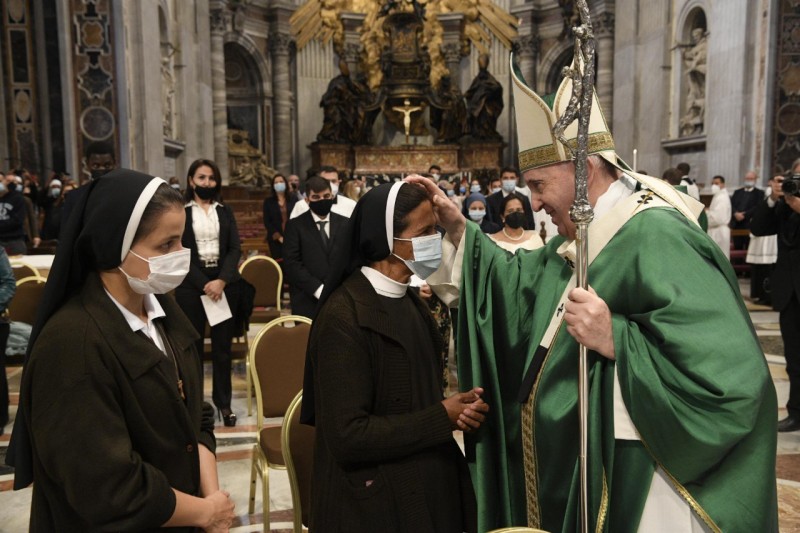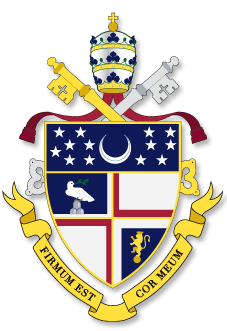The Synod on Synodality
On October 10, 2021, the Holy Father solemnly opened the Synod on Synodality with a Mass in St. Peter’s Basilica. The Synod on Synodality is a two-year process of listening and dialogue began with a solemn opening in Rome on October 9 and 10, 2021 with each individual diocese and church celebrating the following week on October 17. The synodal process will conclude in 2023.
This journey, which follows in the wake of the Church’s “renewal” proposed by the Second Vatican Council, is both a gift and a task: by journeying together and reflecting together on the journey that has been made, the Church will be able to learn through Her experience which processes can help Her to live communion, to achieve participation, to open Herself to mission.
In order to help you participate more fully, both during your pilgrimage to Rome and back home in your diocese, we would therefore like to present a short introduction to what synodality means and what the Synod is about.
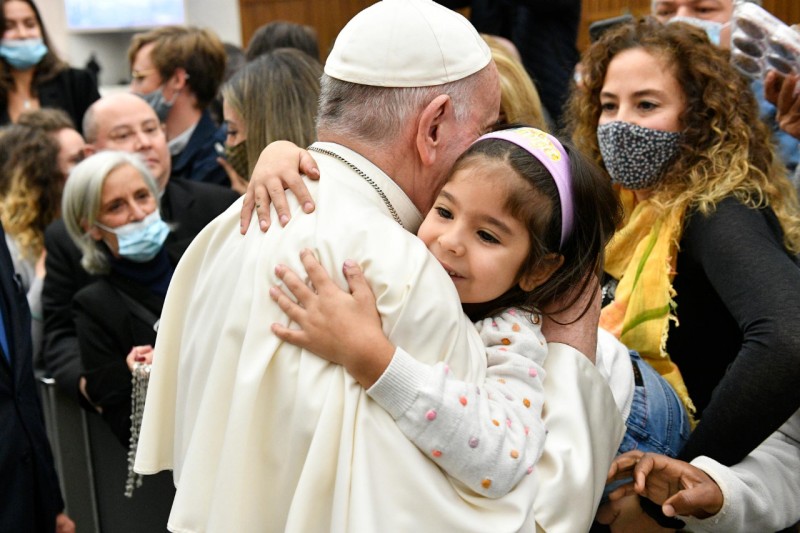
The Keywords: Communion, Participation & Mission
With the opening of the Synod, the Holy Father invites the entire Church to reflect on themes which are decisive for its life an mission. This journey is a continuation of the call for renewal proposed by the Second Vatican Council and is an encouragement to reflect on how the Church can more fully live communion, to encourage a full participation in the life of the Church and to renew her missionary zeal.
In the tradition of the Church, the three words of communion, participation and mission are rich with meaning:
Communion

Man is made to live in communion with God in whom he finds happiness (CCC, 45). Through our faith in Christ, we are also united to all the members of His Body, the Church. The Church is a communion of life, charity and truth, used by Christ as an instrument for the redemption of all and sent forth into the whole world as the light of the world and the salt of the earth (LG 9) . The visible bonds of this communion is our profession of faith (the Creed), the Sacraments, union with the Holy Father and the bishops in communion with him and the mutual bonds of charity within the Body of Christ.
Although her members are scattered throughout the world, the Church brings them into communion with each other in the Holy Spirit. This characteristic of universality which adorns the people of God is a gift from the Lord Himself. Between all the parts of the Church there remains a bond of close communion whereby they share spiritual riches, apostolic workers and temporal resources. (LG 13)
The communion of Christ with the Church on earth, in purgatory and in heaven is shown in its most noble manner in the sacred liturgy. There, we are all gathered into one Church, with one song of praise magnifying the one and triune God (LG 50). Finally, the reception of the Most Holy Eucharist is the clearest and most splendid sign of the communion of the Church.
Participation

The eternal Father, by a free and hidden plan of His own wisdom and goodness, created the whole world. His plan was to raise man to a participation of divine life (LG 2), and this participation in the life of the Most Holy Trinity is the highest and most important form of participation in the human life.
This is accomplished through our participation in the life of grace, which is God pouring out His live into our hearts through the Holy Spirit. We receive this grace through the sacraments, and in a special way the Eucharist, frequent participation in the sacred Liturgy, application of oneself to prayer, self-abnegation, lively fraternal service and the constant exercise of all the virtues. It is the love of God and the love of one’s neighbor which points out the true disciple of Christ. (LG 42)
We enter into participation in the Trinitarian life and the life of grace through the Sacrament of Baptism. The grace received here is later strengthened through the Sacrament of Confirmation, and calls all members of the Church to participate in the mission of Christ. By the Sacraments, especially holy Eucharist, that charity toward God and man which is the soul of the apostolate is communicated and nourished. (LG 33) The Church also desires that all the faithful should be led to a fully conscious and active participation in the liturgy. (SC 14). The faithful should be encouraged to take part by means of acclamations, songs, gestures, bodily attitudes and at the proper times by the observation of a reverent silence. (LG 30).
Mission
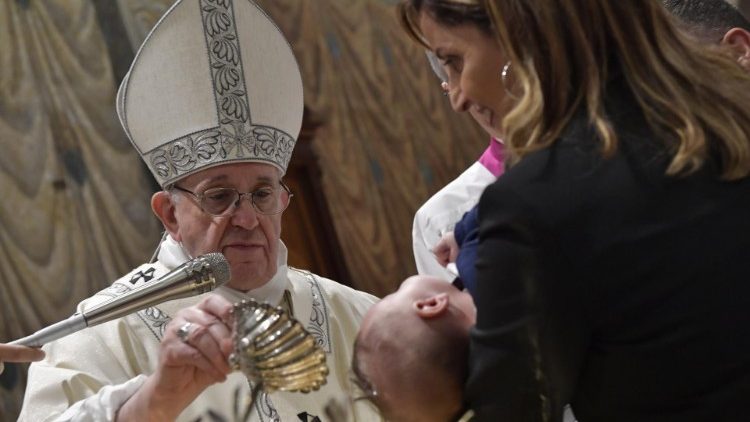
The mission of the Church is very straightforward, following the command of our Lord:
To proclaim and to spread among all peoples the Kingdom of Christ and of God and to be, on earth, the initial budding forth of that kingdom, is the mission of the Church. (LG 5).
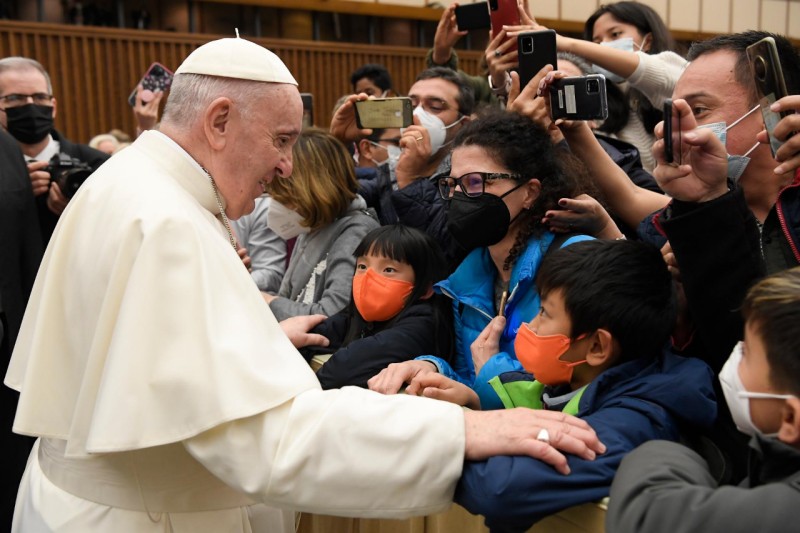
An Introduction to the Synodal Path
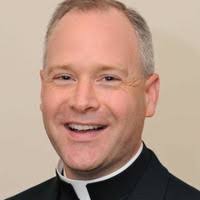
During one of the English Sunday Masses in Santo Spirito in Sassia, Father Christopher Mahar of the Diocese Providence, RI, preached on the Synodal Way and provided a very helpful introduction to the theological meaning of Synodality, highlighting that “The principle of synodality is the action of the Spirit in the communion of the Body of Christ and in the missionary journey of the People of God.” (Synodality in the Life and Mission of the Church, 46).
The Holy Father’s Homily for the Opening of the Synod
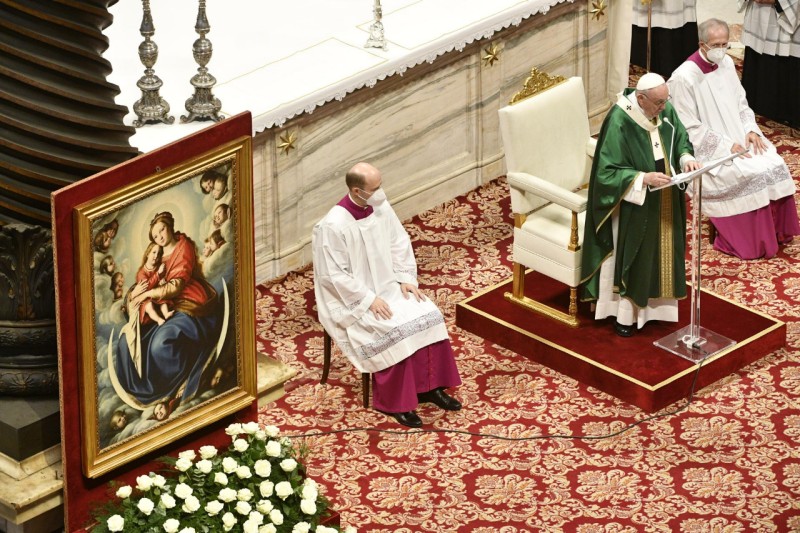
St Peter’s Basilica
Sunday, 10 October 2021
A certain rich man came up to Jesus “as he was setting out on his journey” (Mk 10:17). The Gospels frequently show us Jesus “on a journey”; he walks alongside people and listens to the questions and concerns lurking in their hearts. He shows us that God is not found in neat and orderly places, distant from reality, but walks ever at our side. He meets us where we are, on the often rocky roads of life. Today, as we begin this synodal process, let us begin by asking ourselves – all of us, Pope, bishops, priests, religious and laity – whether we, the Christian community, embody this “style” of God, who travels the paths of history and shares in the life of humanity. Are we prepared for the adventure of this journey? Or are we fearful of the unknown, preferring to take refuge in the usual excuses: “It’s useless” or “We’ve always done it this way”?
Celebrating a Synod means walking on the same road, walking together. Let us look at Jesus. First, he encounters the rich man on the road; he then listens to his questions, and finally he helps him discern what he must do to inherit eternal life. Encounter, listen and discern. I would like to reflect on these three verbs that characterize the Synod.
The first is encounter. The Gospel passage begins by speaking of an encounter. A man comes up to Jesus and kneels down before him, asking him a crucial question: “Good Teacher, what must I do to inherit eternal life?” (v. 17). So important a question requires attention, time, willingness to encounter others and sensitivity to what troubles them. The Lord is not stand aloof; he does not appear annoyed or disturbed. Instead, he is completely present to this person. He is open to encounter. Nothing leaves Jesus indifferent; everything is of concern to him. Encountering faces, meeting eyes, sharing each individual’s history. That is the closeness that Jesus embodies. He knows that someone’s life can be changed by a single encounter. The Gospel is full of such encounters with Christ, encounters that uplift and bring healing. Jesus did not hurry along, or keep looking at his watch to get the meeting over. He was always at the service of the person he was with, listening to what he or she had to say.
As we initiate this process, we too are called to become experts in the art of encounter. Not so much by organizing events or theorizing about problems, as in taking time to encounter the Lord and one another. Time to devote to prayer and to adoration – that form of prayer that we so often neglect – devoting time to adoration, and to hearing what the Spirit wants to say to the Church. Time to look others in the eye and listen to what they have to say, to build rapport, to be sensitive to the questions of our sisters and brothers, to let ourselves be enriched by the variety of charisms, vocations and ministries. Every encounter – as we know – calls for openness, courage and a willingness to let ourselves be challenged by the presence and the stories of others. … The experience of encounter changes us; frequently it opens up new and unexpected possibilities. … So often God points out new paths in just this way. He invites us to leave our old habits behind. Everything changes once we are capable of genuine encounters with him and with one another. …
The second verb is listen. True encounter arises only from listening. Jesus listened to that man’s question and to the religious and existential concerns that lay behind it. He did not give a non-committal reply or offer a prepackaged solution; he did not pretend to respond politely, simply as a way of dismissing him and continuing on his way. Jesus simply listens, for whatever amount of time it takes; he is not rushed. Most importantly, he is not afraid to listen to him with his heart and not just with his ears. Indeed, he does more than simply answer the rich man’s question; he lets him tell his story, to speak freely about himself. Christ reminds him of the commandments, and the man starts to talk about his youth, to share his religious journey and his efforts to seek God. This happens whenever we listen with the heart: people feel that they are being heard, not judged; they feel free to recount their own experiences and their spiritual journey.
Let us ask ourselves frankly during this synodal process: Are we good at listening? How good is the “hearing” of our heart? Do we allow people to express themselves, to walk in faith even though they have had difficulties in life, and to be part of the life of the community without being hindered, rejected or judged? Participating in a Synod means placing ourselves on the same path as the Word made flesh. It means following in his footsteps, listening to his word along with the words of others. It means discovering with amazement that the Holy Spirit always surprises us, to suggest fresh paths and new ways of speaking. It is a slow and perhaps tiring exercise, this learning to listen to one another – bishops, priests, religious and laity, all the baptized – and to avoid artificial and shallow and pre-packaged responses. The Spirit asks us to listen to the questions, concerns and hopes of every Church, people and nation. And to listen to the world, to the challenges and changes that it sets before us. Let us not soundproof our hearts; let us not remain barricaded in our certainties. So often our certainties can make us closed. Let us listen to one another.
Finally, discern. Encounter and listening are not ends in themselves, leaving everything just as it was before. On the contrary, whenever we enter into dialogue, we allow ourselves to be challenged, to advance on a journey. And in the end, we are no longer the same; we are changed. We see this in today’s Gospel. Jesus senses that the person before him is a good and religious man, obedient to the commandments, but he wants to lead him beyond the mere observance of precepts. Through dialogue, he helps him to discern. Jesus encourages that man to look within, in the light of the love that the Lord himself had shown by his gaze (cf. v. 21), and to discern in that light what his heart truly treasures. And in this way to discover that he cannot attain happiness by filling his life with more religious observances, but by emptying himself, selling whatever takes up space in his heart, in order to make room for God.
Here is a valuable lesson also for us. The Synod is a process of spiritual discernment, of ecclesial discernment, that unfolds in adoration, in prayer and in dialogue with the word of God. Today’s second reading tells us that God’s word is “living and active, sharper than any two-edged sword, piercing to the division of soul and spirit, of joints and marrow, and discerning the thoughts and intentions of the heart” (Heb 4:12). That word summons us to discernment and it brings light to that process. It guides the Synod, preventing it from becoming a Church convention, a study group or a political gathering, a parliament, but rather a grace-filled event, a process of healing guided by the Spirit. In these days, Jesus calls us, as he did the rich man in the Gospel, to empty ourselves, to free ourselves from all that is worldly … and to ask ourselves what it is that God wants to say to us in this time. And the direction in which he wants to lead us.
Dear brothers and sisters, let us have a good journey together! May we be pilgrims in love with the Gospel and open to the surprises of the Holy Spirit. Let us not miss out on the grace-filled opportunities born of encounter, listening and discernment. In the joyful conviction that, even as we seek the Lord, he always comes with his love to meet us first.
Ways of Participating
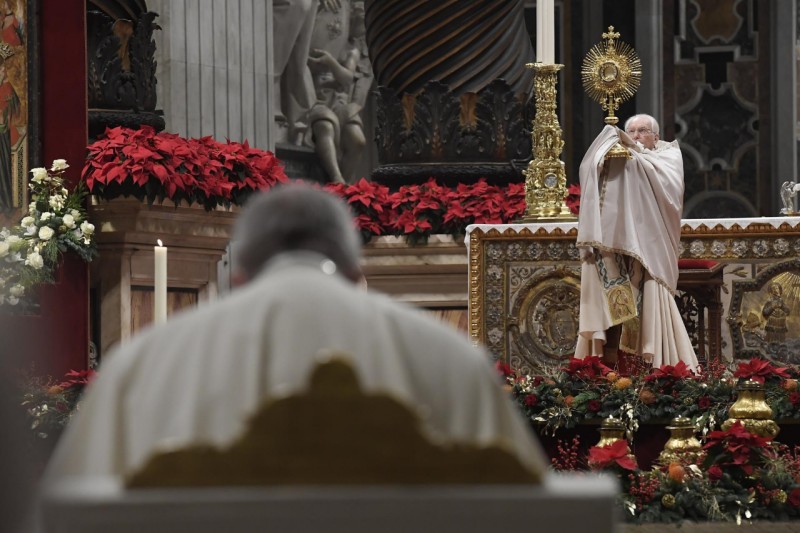
Following the Holy Father’s invitation, there are three important steps in participating in the Synod of Synodality:
Encounter We are called to take time to encounter the Lord and each other. Therefore, we participate in the Synod by attending Mass more frequently, by receiving the Sacraments and going to Eucharistic Adoration. By praying the Rosary with our family and reading Sacred Scripture. By getting to know our fellow parishioners – and the woman in the supermarket – viewing everyone we meet as beloved children of God called to communion with Him. And we participate in this encounter by attending the events organized in our parish and our diocese to create room for prayer and dialogue.
Listen First and foremost, we are called to listen to the voice of God in our times of prayer. What stirs my heart in this times, and what does the Holy Spirit prompt me to do? But God also speaks to us through our neighbour, and in a special way through our bishop and parish priest. What is their dreams and visions for the diocese and for our parents? What are the joys and struggles of my friends and co-workers? What help do they desire to grow in their faith?
Discern In a listening dialogue with all the members of the Church, what does God seem to be calling us to do at this time? How can we meet the needs expressed? How can we bring people back to the Church after the pandemic? And how can we continue to grow in knowledge of God and in love of Him and each other? This is the aim of the Synodal Way, the people of God walking together towards our heavenly homeland.
“The end-point of the journey of the People of God is the new Jerusalem,
Synodality in the Life and Mission of the Church, 23
enveloped by the radiant splendour of God’s glory.”

